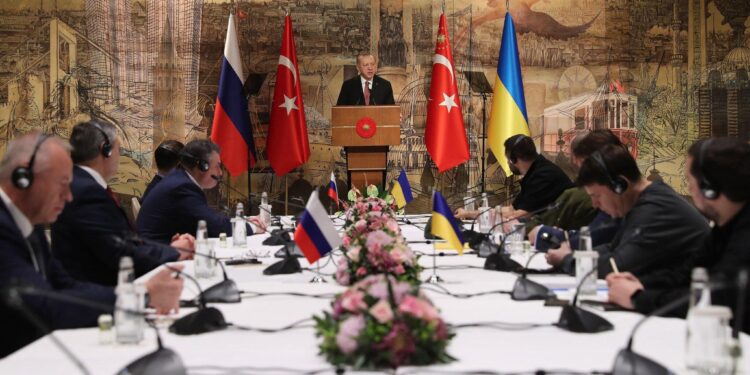The recent Istanbul meeting has captured international attention, spotlighting the evolving dynamics between TĂĽrkiye, Italy, and Libya amid shifting regional and geopolitical landscapes. As key players with vested interests in Mediterranean security, migration, and energy cooperation, the outcomes of this high-level dialogue carry significant implications for all three nations. This article delves into the proceedings of the Istanbul summit, examining what the developments may signal for TĂĽrkiye’s diplomatic stance, Italy’s regional strategy, and Libya’s ongoing path toward stability.
The Istanbul Meeting Sets a New Diplomatic Tone for TĂĽrkiye and Italy
The recent diplomatic exchange in Istanbul between TĂĽrkiye and Italy marks a notable shift in bilateral relations, emphasizing cooperation over competition. Both nations have committed to revitalize their strategic partnership by addressing economic collaboration, regional security, and migration management. This reconnection is particularly significant given the geopolitical complexities surrounding Libya, where both countries hold vested interests. Analysts suggest that the tone of the meeting signals a pragmatic approach, aimed at aligning their policies to foster stability in the Eastern Mediterranean and support reconstruction efforts in Libya.
Key outcomes of the meeting include mutual agreements on:
- Enhanced trade and investment ties, focusing on energy and infrastructure projects
- Joint efforts to combat irregular migration, ensuring safer routes and better humanitarian responses
- Collaborative diplomatic efforts in Libya, promoting dialogue among conflicting parties to achieve lasting peace
These developments not only underscore a shared vision between Ankara and Rome but also highlight their intent to play pivotal roles in Libya’s political future. As regional dynamics evolve, this newfound diplomatic warmth could serve as a catalyst for broader Mediterranean stability and renewed economic partnerships.
| Focus Area | TĂĽrkiye’s Role | Italy’s Role |
|---|---|---|
| Economic Collaboration | Energy infrastructure development | Investment facilitation and trade expansion |
| Migration | Border control and refugee resettlement | Humanitarian aid and diplomatic coordination |
| Libyan Stabilization | Support for political reconciliation | Peacebuilding and security assistance |
Implications for Libya’s Stability Amid Regional Power Dynamics
The outcomes of the Istanbul meeting reveal a complex interplay of interests that could either stabilize Libya or exacerbate existing tensions. As TĂĽrkiye and Italy seek to assert their influence, Libya’s fragile political landscape remains at the mercy of external agendas. The delicate balance of power within Libya is threatened by competing regional actors vying for strategic footholds, which risks prolonging instability. Stakeholders must navigate a labyrinth of alliances and rivalries, where even small shifts in support can tip the scales toward renewed conflict or fragile peace.
Key factors shaping Libya’s future amid these dynamics include:
- External military support and its impact on local militias
- Economic control over Libya’s energy resources
- Diplomatic engagements between regional powers influencing domestic governance
| Country | Strategic Interest | Potential Influence |
|---|---|---|
| TĂĽrkiye | Security cooperation & naval rights | High – Military backing to allied factions |
| Italy | Migrant control & energy partnerships | Moderate – Diplomatic and economic leverage |
| Libya | Political sovereignty & reconstruction | Unstable – Divided domestic factions |
Strategic Recommendations for Strengthening Triangular Cooperation
Enhancing communication channels stands as a fundamental step for TĂĽrkiye, Italy, and Libya to maximize the potential of their trilateral partnership. Establishing a dedicated communication platform, supported by regular high-level dialogues, can foster transparency and swift resolution of emerging issues. This approach will not only solidify mutual understanding but also streamline decision-making processes across political, economic, and security spheres, setting the stage for sustained cooperation.
Furthermore, prioritizing joint infrastructure and energy projects can serve as a catalyst for economic integration within the region. By leveraging complementary strengths-TĂĽrkiye’s industrial capacity, Italy’s technological expertise, and Libya’s resource potential-the three nations can design collaborative initiatives that create jobs and boost trade. Below is a suggested framework to guide future cooperation efforts:
| Strategic Focus | Key Actions | Expected Outcomes |
|---|---|---|
| Energy Security | Joint renewable energy projects and pipeline development | Reduced dependency, enhanced supply stability |
| Trade Facilitation | Streamlining customs and bilateral trade agreements | Increased export-import volume, economic growth |
| Security Cooperation | Coordinated counter-terrorism and border security operations | Improved regional stability and safety |
To Conclude
As the dust settles on the Istanbul meeting, the emerging dynamics signal a nuanced shift in the geopolitical landscape of TĂĽrkiye, Italy, and Libya. With strategic interests intertwined and regional stability hanging in the balance, the outcomes of this engagement will likely reverberate beyond the immediate parties involved. Observers will be watching closely to see whether the promises made translate into tangible progress on diplomacy, security cooperation, and economic partnership-factors crucial not only for the three nations but for the broader Mediterranean region. The Istanbul meeting, therefore, stands as a pivotal moment, offering both opportunities and challenges that will shape the trajectories of TĂĽrkiye, Italy, and Libya in the months to come.
















